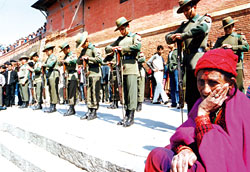13 February 1996 Maoists attack a police post in Holeri, Rolpa signalling the launch of their 'people's war'. Earlier, Baburam Bhattarai presented a 40-point demand to Prime Minister Sher Bahadur Deuba who ignored it and went to India on a state visit. 
NARENDRA SHRESTHA
25 February 1996 Home Minister Khum Bahadur Khadka promotes a hardline approach and says the Maoists can be crushed 'within days".
March 1996 Deuba convenes an all-party meeting to look into the Maoist issue but there is lack of seriousness.
Rest of 1996 Maoists make sporadic raids on police stations in mid-western Nepal and Sindhuli capturing weapons, ransack distilleries and multinational targets.
February 1997 Government launches a harsh police crackdown in the midwestern hills but many innocents suffer and this feeds the Maoist insurgency with fresh recruits.
March 1997 There is continued disarray in coalition politics in Kathmandu and disillusionment with the return of Panchayat-era apparatchik Lokendra Bahadur Chand as prime minister in a UML-RPP coalition.
May 1997 Maoists boycott local elections, eight people are killed in campaign violence. Government forms a task force to find a political solution to the Maoist problem.
July 1997 Home Minister Bamdeb Gautam tries to pass TADA but backtracks after protests.
October 1997 The RPP splits and Surya Bahadur Thapa replaces Chand to form a government with the NC and NSP. By now more than 50 VDCs in Rolpa alone under Maoist control.
March 1998 Public disenchantment with political parties grows as the UML also splits and Girija Koirala takes over and immediately launches Operation Kilo Sierra Two to nip the Maoists before it's too late. By the end of 1998 500 people had beenkilled, most of them not Maoists.
October 1998 The Maoists spread out of the midwestern hills for the first time into central Nepal and the eastern hills.
May 1999 Parliamentary elections are held and the Maoists call for a boycott. Krishna Prasad Bhattarai becomes prime minister and he appoints Sher Bahadur Deuba into a committee to find a solution to the Maoist problem.
March 2000 Congress infighting intensifies and Koirala ousts Bhattarai. Maoists use the chaos in Kathmandu to continue attacks on police posts and government offices. Police start pulling out of rural areas in the midwest.
25 September 2000 Dunai attacked 14 policemen killed, first of many subsequent human wave attacks by Maoists on district capitals. Home Minister Govinda Raj Joshi resigns.
October 2000 Deputy PM Ram Chandra Poudel meets Maoist leader Rabindra Shrestha in Kathmandu to find a solution.
February 2001 Maoists use anniversary of war to announce the Prachanda Path doctrine
April 2001 In a wave of attacks in Rukum and Dailekh Maoists kill 70 policemen in a week and loot weapons. Police chief says he can't fight Maoists by himself the paramilitary Armed Police Force is set up.
1 June 2001 The royal massacre, three kings in four days. King Gyanendra is enthroned. The Maoists infiltrate street protests in Kathmandu.
July 2001 Maoists begin attacks against public schools and declare war on alcohol.
6-13 July 2001 Maoists attack Holeri, army refusal to rescue captured police creates political crisis and Koirala resigns as prime minister to be replaced by Deuba. Maoists kill 40 policemen in an attack in Lamjung, Nuwakot, Ramechhap, Gulmi Dailekh and agree to a ceasefire.
August 2001 Madhab Kumar Nepal and Bamdeb Gautam meet Prachanda in Silguri in India.
November 2001 After three rounds of talks Maoists escalate the war by attacking the army for the first time by overrunning the Ghorahi base and attacking Salleri, killing soldiers and looting a large amount of automatic weapons and mortars. King Gyanendra declares Emergency and deploys RNA to fight Maoists.
February 2002 Maoists storm Mangalsen, out of a garrison of 59 soldiers only two survive.
Spring 2002 Tourism collapses, investments plummet, industries are hit by Maoist extortion and threats.
May 2002 Deuba dissolves parliament, announces elections for November.
4 October 2002 Deuba proposes postponing elections because of security situation, King Gyanendra sacks him, assumes executive authority and sets up government of technocrats.
January 2003 IGP Krishna Mohan Shrestha and wife murdered in Kathmandu, ceasefire declared three days later.
May 2003 Chand replaced by Surya Bahadur Thapa
August 2003 Doramba massacre of 19 rebels and civilians by army leads to collapse of ceasefire, Maoists step up campaign of destroying infrastructure: mainly phones and bridges. Step up attacks and closure of schools, abducting children for indoctrination.
October 2003 Maoists kill 37 police in raid on police training base in Bhalubang.
December 2003 International community increasingly concerned about human rights violations, India arrests Matrika Yadab and Suresh Ale Magar and hands them over to Nepal.
February 2004 King Gyanendra addresses rallies in Nepalganj and Biratnagar.
April 2004 Political parties launch street agitation against 'regression', it is slow to gather momentum. Surya Bahadur Thapa replaced by Deuba again.
September 2004 After small explosive goes off at USIS, the Peace Corps is withdrawn from Nepal.
November 2004 Dailekh's mothers can't take it anymore and rise up against the Maoists.
December 2004 Raids in Argakhanchi, Dailkeh heavy casualties on both sides. Maoists blockade Kathmandu for one week.
1 February 2005 King Gyanendra sacks Deuba again, dissolves parliament, cuts phones internet and sends army into newsrooms. Hundreds of politicians and civil society activists are jailed. International condemnation.
April 2005 After debate at the UN in Geneva, an office of the UN High Commissioner on Human Rights is set up in Kathmandu. Deuba arrested on corruption charges.
June 2005 Maoists blow up bus in Madi, killing 37 passengers and injuring 70. Worst-ever terrorist attack in Nepal.
September 2005 Maoists declare three-month unilateral ceasefire, government fails to respond. King Gyanendra continues his walkabouts in various parts of the country.
October 2005 Tourism bounces back with ceasefire.
November 2005 Government cracksdown on media and prepares guidelines for NGOs.
December 2005 Maoists extend ceasefire by a month
3 January 2006 Back to war.


